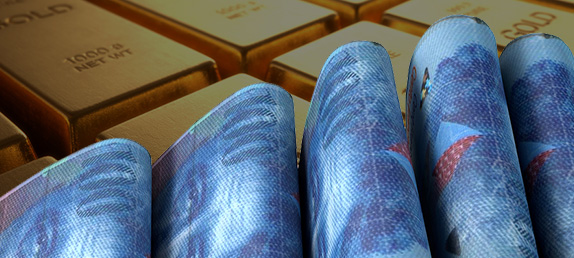
A century ago, every nation’s currency was linked directly to physical gold, meaning that it was necessary to keep reserves of the precious metal to stabilize the value of paper money. The United States famously kept their gold reserves at Fort Knox, where some $261 billion worth of the metal remains today, but America went off the gold standard in the 1970s. Today, few western nations utilize the gold standard, though a Swiss political shift could bring the idea back in vogue.
Switzerland Shocks All By Uncapping The Franc
For the past five years, Switzerland has tied their currency, the franc, to the euro in order to receive a favorable rate with its main trading partners. With a major recession on the horizon for the eurozone, however, the euro currency cap would appear to be more like an anchor than a beneficial tool for Swiss monetary policy. In a decision that shocked the greater world, the Swiss government announced on January 15th that they would eliminate the euro currency cap (previously set at 1.20 francs per euro). Luzi Stamm, a member of Swiss Parliament, is well-known for advocating a return to the gold standard, and praised the move as a step in the right direction.
Given that the Swiss enjoy a positive trade surplus (30 billion francs, or approximately $25 billion), this move was meant to keep their currency down rather than propping it up, though the franc did surge 41% after the news and was dubbed on social media “Francogeddon.” Just days before the shocking announcement, Swiss National Bank chairman Thomas Jordan had confirmed the cap as necessary for the Swiss economy. But news also hinted that the European Central Bank would soon be printing massive amounts of paper money soon—and this could have spurred the decision.
The Swiss aren’t interested in currency devaluation if the franc is kept on par with an inflated euro, since this would cause demand for Swiss exports to shrink. Instead, in order to stabilize the franc, the Swiss National Bank would need to keep a huge amount of gold in the country’s reserves (the equivalent to amount held in the United States Federal Reserve), which makes for an interesting and thorny problem, given that the Swiss sold or leased away most of their gold holdings over the past decade and a half. Swatchgroup CEO Nick Hayek called the situation a financial “tsunami,” considering the upset of the euro, the impact on exports, and the urgent need for the Swiss government to snap up gold to provide the financial backbone of the franc.
How The Swiss Move Will Affect Gold Prices
The Swiss government would need to hold 20% of their total currency value in gold in order to make the gold-backed franc into a viable economic policy. That’s a hugely tall order for any government, even if they’re the 20th largest GDP in the world. Currently, the Swiss National Bank holds only about seven percent of the total Swiss GDP in gold, necessitating a three-fold increase of buying gold for the reserves. What’s more, a gold standard would mean that the Swiss government cannot sell the gold that they purchase in the near future. This policy was put in place after the early 2000s, when the Swiss sold or leased gold at low rates, since gold prices compared poorly with global currency at the time. Today, the exact opposite 1 is the case, as the price of the euro against gold peaked in July and has been falling steadily ever since.
The euro cap meant that the Swiss National Bank had to maintain Euro holdings of $175 billion, a large quantity in a currency that is either losing value each day or showing no tangible growth. Compare that with a holding of gold, which gains value year-over-year consistently, and it makes much more sense to hold an increasingly valuable commodity than a decreasingly valuable currency. The European Central Bank notes that three out of the four likely consequences of the Swiss gold push will have a favorable impact on the price of gold itself as the metal will rise in demand. It’s not unrealistic to think the Swiss government will be the largest gold buyer on the market in 2015.
Conclusion
The recent events in Switzerland and Europe had driven the price of gold up by nearly $20 per ounce in the span of only two weeks. That figure is expected to climb steadily as the Central Bank expands its holdings and as investors look for a hedge against a failing euro. If you want to profit from the rising tide of gold, contact SBC Gold to get information on buying gold and investing in precious metals so that the next currency crisis puts gains in your pocket.
Additional Sources


